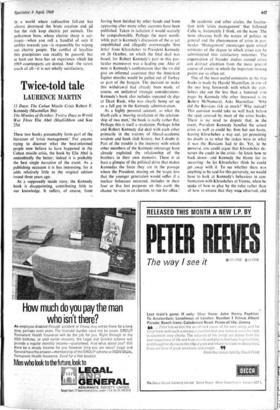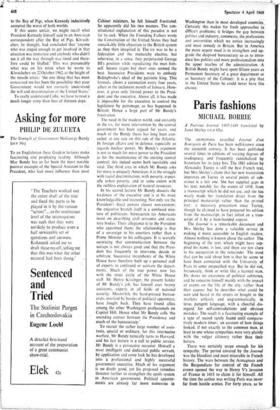Twice-told tale
LAURENCE MARTIN
13 Days: The Cuban Missile Crisis Robert F. Kennedy (Macmillan 30s) The Missiles of October: Twelve Days so World War Three Elie Abel (MacGibbon and Kee 25s) These two books presumably form part of the literature of 'crisis management.' For anyone trying to discover what the best-informed people now believe to have happened in the Cuban missile crisis, the book by Elie Abel is. undoubtedly the better; indeed it is probably the best single narrative of the event. As a publishing occasion it is less interesting, for it adds relatively little to the original edition issued three years ago.
As a supposedly inside story, the Kennedy book is disappointing, contributing little to our knowledge. It suffers, of course, from having been finished by other hands and from appearing after many other accounts have been published. Taken in isolation if would scarcely be comprehensible. Perhaps the most worth- while part is Kennedy's discussion of the as yet unpublished and allegedly overwrought 'first letter' from Khrushchev to President Kennedy on 26 October, on which the final deal was based, for Robert Kennedy's part in this par- ticular manoeuvre was a leading one. Also of note is Kennedy's confirmation that the us did give an informal assurance that the American Jupiter missiles would be pulled Out of Turkey as part of the bargain. The decision to make this withdrawal had already been made, of course, on unilateral strategic considerations. Kennedy's book also includes repeated sly digs at Dean Rusk, who was clearly being set up as a fall guy in the Kennedy administration.
As a highly personal account, as what the blurb calls a 'moving revelation of the relation- ship of two men,' the book is really rather fiat. Perhaps this is itself a revelation. Perhaps John and Robert Kennedy did deal with each other primarily in the truisms of liberal-academic wisdom and book club history, but I doubt it. Part of the trouble is the intensity with which other members of the Kennedy entourage have already exploited the relationship of the brothers in their own memoirs. There is at least a glimpse of the political drive that makes Kennedys the force they are in the passage where the President, musing on the tragic loss that the younger generation would suffer if a nuclear holocaust occurred, includes in their four or five lost purposes on this earth the chance 'to vote in an election, to run for office.' In academic and other circles, the fascina- tion with 'crisis management' that followed Cuba is, fortunately I think, on the wane. The term obscures both the nature of politics in general and the phenomenon of crisis in par- ticular. 'Management' encourages quite unreal estimates of the degree to which crises can be administered into satisfactory outcomes. The organisation of broader studies around crises can distract attention from the more general course of events in which the important turning points are so often set.
One of the most useful comments in the two books is made by Harold Macmillan, in one of the two long forewords with which the pub- lishers eke out the less than a hundred sl'm pages by Kennedy (the other foreword is by Rro be r t McNamara). Asks Macmillan: 'Why did the Russians risk so much?' Why indeed? This question would take us well back before the span covered by most of the crisis books. There is no need to dispute that, in the event, President Kennedy handled the actual crisis as well as could be; firm but not hasty, leaving Khrushchev a way out, yet permitting no doubt as to what the stakes were or what it was the Russians had to do. Yet, to be perverse, one could argue that Khrushchev de- serves the credit in the crisis—he knew how to back down—and Kennedy the blame for its occurring—he let Khrushchev think he could get away with it. To see whether there was anything to be said for this perversity, we would have to look at Kennedy's behaviour in con- frontation with Khrushchev at Vienna, when he spoke of how to play by the rules rather than of how to ensure that they were observed, and to the Bay of Pigs, when Kennedy indecisively accepted the worst of both worlds.
If this seems unfair, we might recall what President Kennedy himself said to an American correspondent after the Bay of Pigs. Khrush- chev, he thought, had concluded that 'anyone who was stupid enough to get involved in that situation was immature and anybody who didn't see it all the way through was timid and there- fore could be bluffed.' This was presumably what was on his mind when he wrote to Khrushchev on 22 October 1962, at the height of the missile crisis: 'the one thing that has most concerned me has been the possibility that your Government would not correctly understand the will and determination of the United States.'
To really understand Cuba, we have to read a much longer story than that of thirteen days.



































 Previous page
Previous page